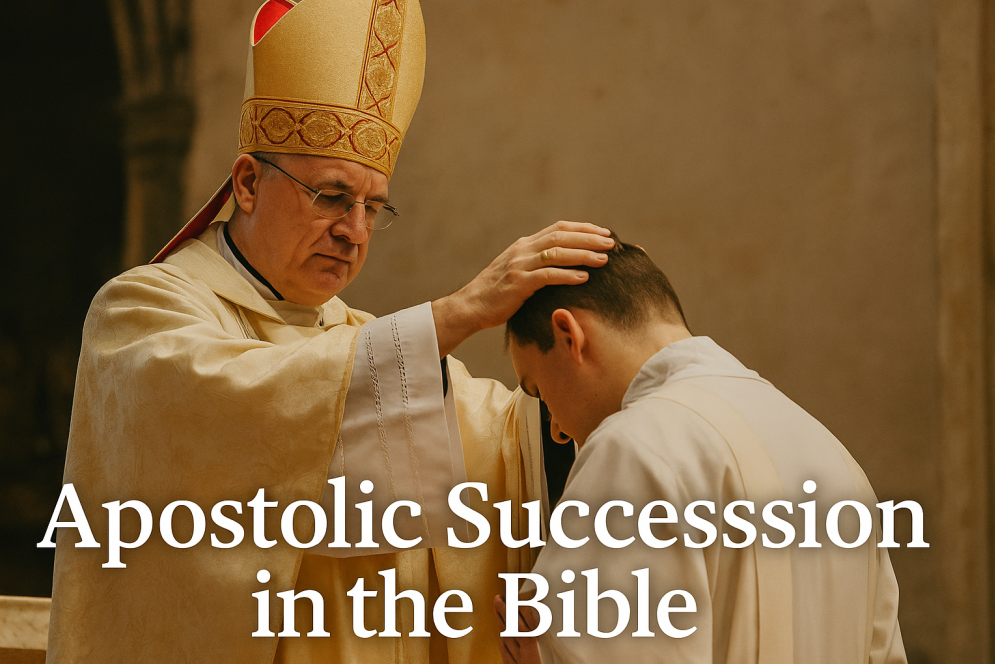
How do we know who speaks for Christ today? For the first Christians, it was simple: they traced the teaching and authority of a person or community back to the apostles themselves. That process—apostolic succession—was how they knew who truly taught the faith Jesus handed down.
Apostolic succession means that the power and authority Jesus gave the apostles didn’t die with them, but was passed on through ordained successors, what we call bishops. It’s not a man-made invention—it’s the biblical model for preserving Christ’s voice in the Church. As St. Ignatius of Antioch, a disciple of the apostle John, wrote around A.D. 107: “Where the bishop is, there is the Church.” For early Christians, unity with the bishop—who stood in the line of succession from the apostles—was how they identified the true Church.
But does the Bible actually support this? Let’s walk through it.
What Is Apostolic Succession?
Apostolic succession is the unbroken line of bishops going back to the apostles. Through the laying on of hands, the apostles ordained men to carry on their mission and preserve their teaching (see Acts 6:6; 14:23). This process ensured the Church stayed rooted in Christ’s teaching, not personal opinions.
Early Christians used apostolic succession as the test of legitimacy: if your teachers couldn’t trace their authority back to the apostles, your doctrine was suspect. Today, Catholic bishops can trace that line. Most Protestant groups don’t even attempt to.
Scripture’s Clear Support for Apostolic Succession
🔹 2 Timothy 2:2 – Paul’s Succession Blueprint

Paul tells Timothy:
“What you have heard from me before many witnesses entrust to faithful men who will be able to teach others also.”
That’s four generations of apostolic succession in one verse:
- Paul
- Timothy
- Faithful men
- Those men will teach others
Succession wasn’t optional—it was planned.
🔹 Acts 1:15–26 – Replacing Judas
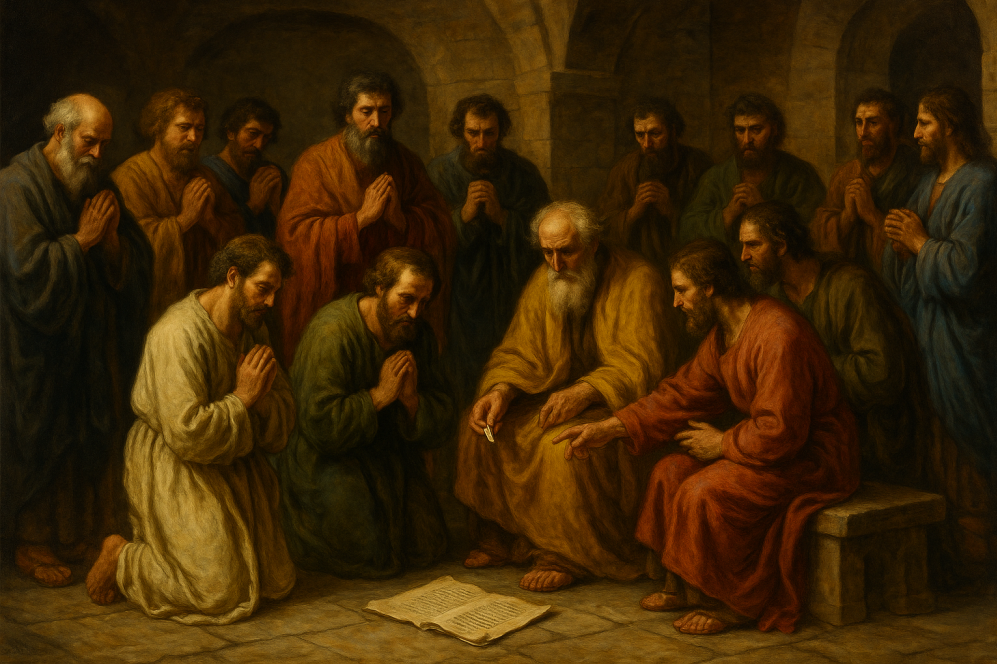
After Judas’ betrayal and death, the apostles didn’t say, “Oh well, guess we’re down to eleven.” Instead, they prayed and chose Matthias to take his office. Scripture even uses the Greek term episkopē—bishopric—for Judas’ office (Acts 1:20). That’s the same root word used in 1 Timothy 3:1 to describe the office of bishop.
🔹 Titus 1:5 – Authority Delegated to Titus
Paul tells Titus:
“Appoint elders in every town as I directed you.”
This is a continuation of apostolic authority. Paul doesn’t say, “Just read the Bible”—he gives Titus real authority to lead and ordain.
The Laying on of Hands: Not Symbolic, but Sacramental

Scripture often speaks of “the laying on of hands”—a sign of ordination and the conferring of authority:
- 1 Timothy 4:14 – Timothy received his gift through the laying on of hands.
- 2 Timothy 1:6 – Paul tells Timothy to “rekindle the gift…through the laying on of my hands.”
- Hebrews 6:1–3 – Lists “laying on of hands” as a foundational Christian doctrine.
The Catechism of the Catholic Church (CCC 1597) explains that Holy Orders is conferred this way, marking the man permanently for ministry.
Sent with Authority: Apostolic, Not Just Sincere
Jesus said in John 20:21:
“As the Father has sent me, so I send you.”
That word “send” is apostellō—from which we get apostle. It doesn’t mean, “Go if you feel like it.” It means being commissioned with authority.
Paul echoes this in Romans 10:14–15:
“How can they preach unless they are sent?”
You can’t just decide to speak for Christ. You must be sent by someone who was sent—that’s succession.
Apostolic Unity: Acts 15 and the Council of Jerusalem
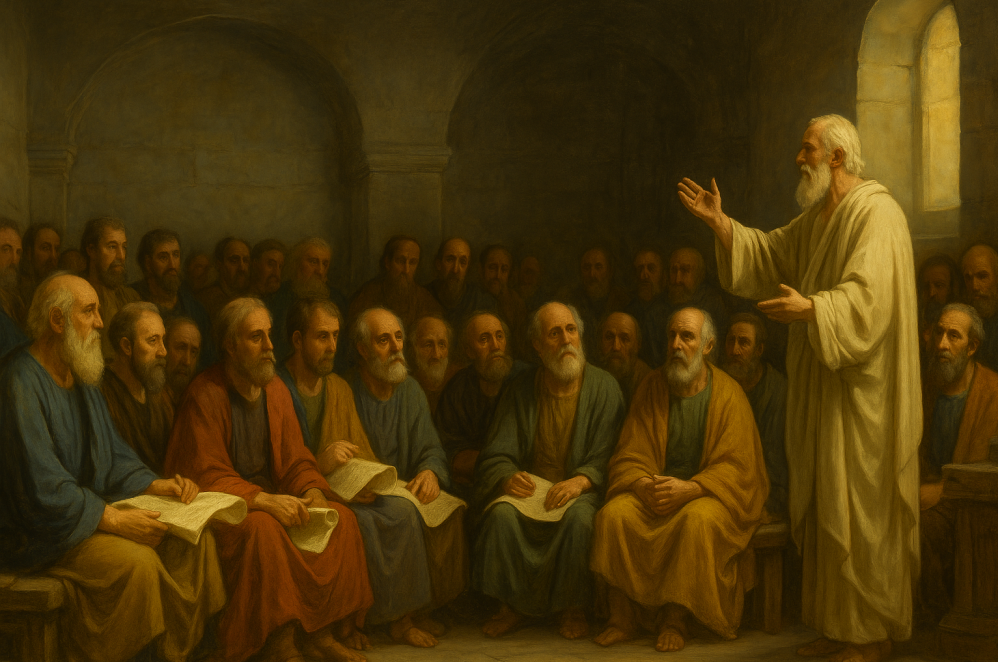
In Acts 15, when a serious doctrinal dispute arises, the apostles and elders gather, discuss, and issue a binding decision—not as individuals, but united. They write:
“It seemed good to the Holy Spirit and to us…” (Acts 15:28)
That’s apostolic teaching. Not individual opinion—unified, Spirit-led judgment. Acts 16:4–5 says the churches were strengthened by observing their decision.
The Nicolaitans: A Warning Against Rogue Authority
In Revelation 2, Jesus rebukes the Nicolaitans, a sect founded by Nicolaus, one of the first deacons (Acts 6:5). He went rogue and rejected Church authority.
Jesus says:
“You hate the works of the Nicolaitans, which I also hate.” (Rev 2:6)
Rebellion against apostolic authority was condemned from the start—even if it came from someone ordained.
Why Apostolic Succession Still Matters
Without apostolic succession, you get thousands of self-appointed “teachers,” each claiming to speak for Christ but teaching contradictory things.
With succession, you get unity, consistency, and protection from error—because Christ promised, “He who hears you hears me” (Luke 10:16).
Jesus didn’t leave us a book and say, “Figure it out.” He left us a Church with authority—built on the apostles and continued through their successors (Eph 2:20).
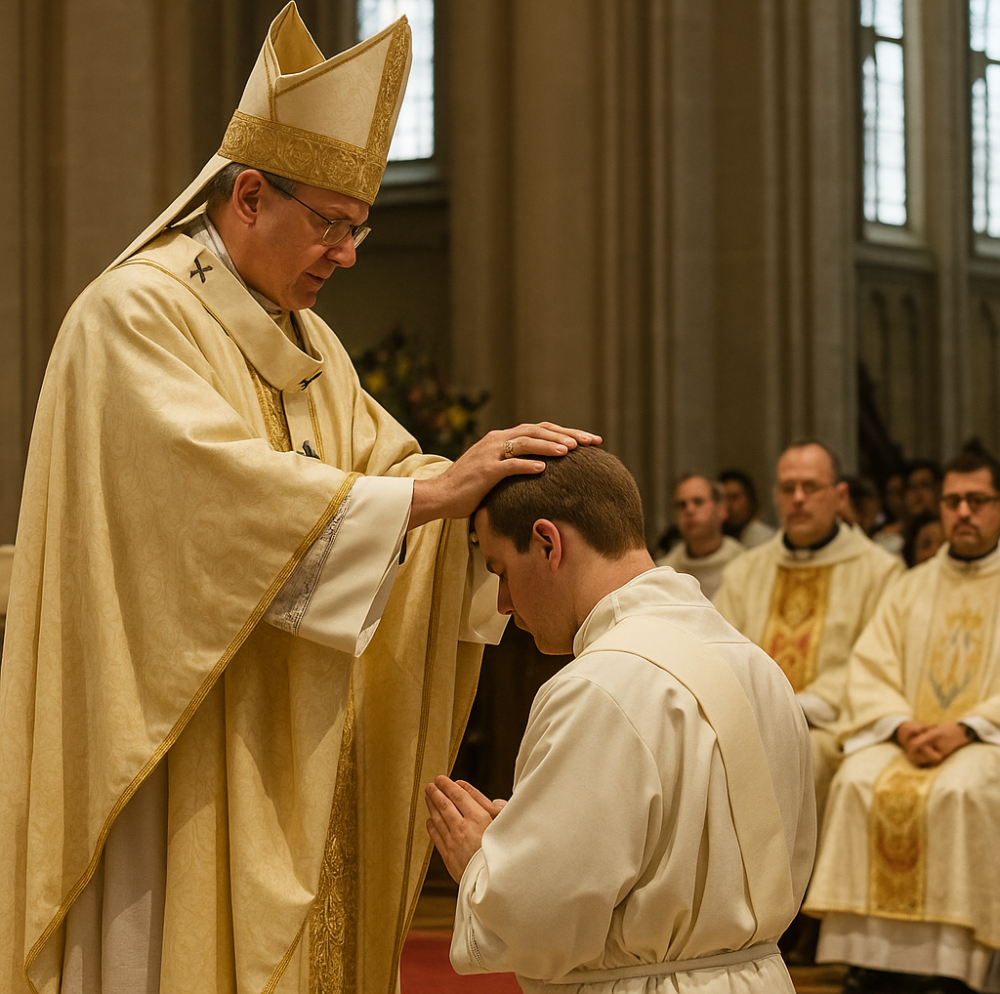
Final Thought
Apostolic succession isn’t a later invention—it’s baked into the New Testament. The early Church lived it, Scripture supports it, and the Catholic Church continues it.
If Christ sent His apostles with His authority, and they in turn sent others—then rejecting that succession is not just rejecting men.
It’s rejecting the One who sent them.
*This post contains affiliate links. If you make a purchase through these links, I may earn a commission at no extra cost to you. As an Amazon Associate I earn from qualifying purchases.
Suggested Reading:
- The Early Church Was the Catholic Church Paperback – by Joe Heschmeyer
- The Epistles of St. Ignatius of Antioch: 7 Letters of an Apostolic Father to the Early Churches
- The Apostolic Succession in the Holy Scriptures (GOD IN HIS WORK OF LOVE) – by Father Louis Dupuis
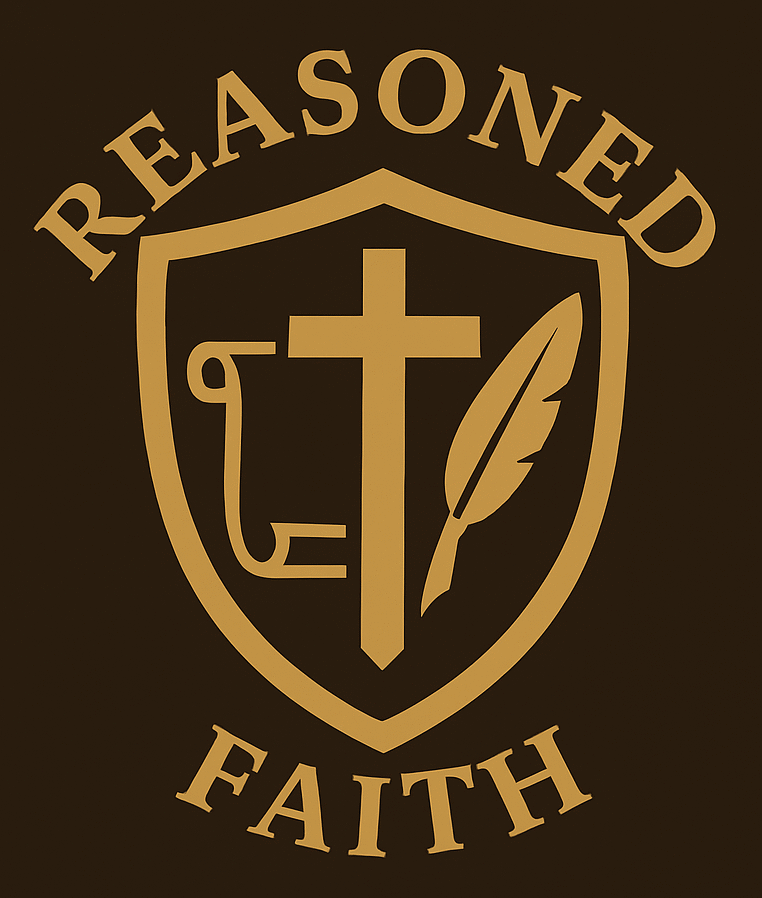
Thank you for sharing this well-researched perspective on apostolic succession. As someone from a Protestant background, I agree that the New Testament clearly shows the apostles appointing and training leaders, and that preserving sound teaching is vital for the Church. However, I see things differently regarding the idea that biblical authority rests on an unbroken line of ordination.
From my understanding, the emphasis in passages like 2 Timothy 2:2 is on faithfully passing down the message of the Gospel, rather than establishing a formal office that must be maintained indefinitely. I believe that true “succession” comes from faithfulness to Scripture and the apostolic teachings, rather than from a guaranteed preservation of authority through human lineage.
That said, I appreciate how this post highlights the importance of unity, accountability, and the need to guard against false teaching; values that all Christians should uphold, even if we have different views on the structures used to maintain them.
Thank you for such a thoughtful and charitable comment. I think you’ve touched on one of the core areas where Protestants and Catholics share common ground—we both agree that the gospel message must be faithfully guarded and passed on. Without that, “succession” in any form would be meaningless.
Where the Catholic interpretation builds further is in recognizing how the earliest Christians, including those discipled directly by the apostles, understood Paul’s words in passages like 2 Timothy 2:2. Historically, the men closest to the source—the early Church Fathers like Irenaeus of Lyons, Tertullian, and Cyprian—consistently tied the preservation of the apostolic message to the preservation of the apostolic office. In their view, you safeguarded the “deposit” Paul speaks of not only by ensuring the message remained pure, but also by entrusting it to leaders ordained in an unbroken chain going back to the apostles themselves.
This wasn’t a later invention—it was the natural continuation of the New Testament pattern. Acts 14:23, Titus 1:5, and 1 Timothy 3 show apostles appointing overseers and elders, and by the second century, we see written records of churches pointing to their line of bishops as proof they still held the authentic apostolic faith. For them, the office was not a replacement for the message, but the God-given safeguard for it.
Historical reality check: By the early 2nd century, the Church was already dealing with false teachers—like the Gnostics—who claimed to follow Scripture yet twisted its meaning. They presented “faithfulness to the gospel” while cutting themselves off from the apostolic churches. The Fathers responded not by appealing to “Scripture alone” in isolation, but by pointing to the churches that could trace both their doctrine and their leaders directly back to the apostles. This was their proof of authenticity, and it’s exactly the pattern Paul set in motion in 2 Timothy 2:2.
You mentioned that you “believe that true succession comes from faithfulness to Scripture and the apostolic teachings, rather than from a guaranteed preservation of authority through human lineage.” That raises an important question: without a formal apostolic lineage to anchor interpretation, how is that faithfulness preserved in practice—especially given that the Protestant approach has resulted in thousands of different interpretations of Scripture and even disagreements on the core of the Gospel itself? The historical evidence suggests that the early Church solved this problem by uniting both message and office, so that fidelity to the truth was tied to an identifiable, continuous chain of leaders who could be traced back to the apostles.
So, while 2 Timothy 2:2 absolutely emphasizes faithful transmission of the gospel, the historical witness suggests that the earliest Christians saw that faithfulness as being best protected through both message and office. In other words, the unbroken succession of leadership wasn’t just a human tradition—it was seen as part of Christ’s provision to ensure His Church could “teach others also” without the message being lost or corrupted.
Thank you for a clear and balanced exploration of apostolic succession and its role in church authority. You spoke thoughtfully about the ways different traditions—Catholic, Orthodox, Anglican, and others—anchor their views in history, scripture, and early Church continuity. It’s refreshing to read a post that explores both the Biblical foundations (like the laying on of hands in 2 Timothy 2:2 and Hebrews 6) and the interpretive differences across Christian traditions.
From your study, which Scripture passage or early Church document—like Clement’s letters or the writings of Church Fathers—struck you most powerfully in affirming apostolic succession?
Have you found any particular theological traditions (e.g., Anglican vs. Orthodox vs. Catholic) that offer especially compelling or reconciliatory views on how apostolic succession should be understood today?
Thank you for reading and for such a thoughtful comment! For me, one passage that stands out most clearly is 2 Timothy 2:2—where Paul instructs Timothy to entrust the faith to “faithful men who will be able to teach others also.” It presents a four-generation chain of authority from Paul to Timothy to ordained ministers and then to those they teach. The early Church understood that this continuity wasn’t merely instructional, but sacramental. A powerful witness to this comes from St. Irenaeus (c. 180 A.D.), who wrote that the Church preserves the apostles’ teaching through an unbroken succession of bishops, specifically naming Rome as an example (Against Heresies 3:3). His point isn’t about titles—it’s about guarding the faith through visible, traceable continuity.
As for different traditions today, I genuinely appreciate how the Orthodox and Catholic Churches share a fundamentally sacramental view of succession as something received, not invented. Anglican theology often emphasizes the historic episcopate in a way that seeks unity and continuity, which is admirable, but it tends to diverge in practice due to differing views on sacramental authority. In my own Catholic understanding, apostolic succession isn’t just a historical argument—it’s Christ’s way of ensuring that His voice remains present and trustworthy across every generation. That continuity matters not for winning debates, but for receiving the same faith the apostles handed on.